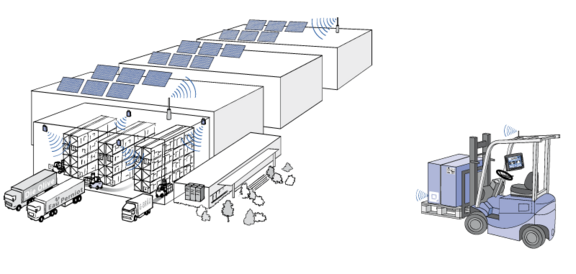DLoG GmbH adopts an Open Source Solution
DLoG GmbH
Apart from solutions under Windows® and UNIX, DLoG GmbH, a leading specialist supplier of vehicle terminals that are suitable for industrial purposes, now also offers devices based on the open operating system Linux. In cooperation with emlix, the terminal specialists from Olching have developed a powerful WLAN driver and a WPA module (Wi-Fi protected access supplicant). These open source solutions ensure considerably improved WLAN connection of warehouse vehicles such as fork-lift trucks and stock picking vehicles. For the user, this not only means an improvement in terms of reliability and future-proofing, but also a reduction in licensing costs and IT expenses.
In the logistics sector, fork-lift trucks are equipped with terminal systems which control the processing of orders. These mobile terminals are connected to the logistics computer system by means of wireless LAN technology. Originally, this technology was developed for the consumer market, which makes it very cheap. Nevertheless, the applied protocols are, in principle, sufficiently robust for industrial use. Due to the marked orientation of wireless LAN products to the consumer and the IT market, however, problems arise when – as in warehouses where stock must be selected – there is a particularly high density of access points and wireless LAN clients, and when the access point needs to be changed at a high frequency.
Reliable availibility is required
Furthermore, the underlying specifications leave some scope for interpretation, especially at the higher protocol levels, which results in devices, access points and clients behaving in different ways. Additionally, adverse conditions for high frequency technology often prevail in warehouses; metal surfaces cause disturbances, as do, for example, food products containing water. At the same time, the requirements on connection availability are high.
The hardware, as well as those lower protocol levels that are implemented in close relation to the hardware, function extremely reliably despite the often very cheap products and the adverse conditions. But the driver software usually has only limited suitability for such applications.
For applications in the fields of warehousing and logistics, a trouble-free connection via WLAN and WLAN roaming is crucial. Speed plays a decisive role in competition. Therefore, emlix has optimized an open source WLAN driver and WPA supplicant for the vehicle terminals from DLoG GmbH, so that reliable high-speed WLAN roaming can be guaranteed with WEP, and in the future with WPA according to the IEEE 802.11i standard.
Adaption to difficult conditions
Frequently, the configurability of the drivers has also been very limited, which is quite appropriate in the consumer market sector where ease of use is of paramount importance. This reflects the demand for "plug and play" devices. In the industrial sector, however, this configurability is of vital importance in order to allow optimal adaptation to difficult conditions to be carried out. In the course of the development partnership between DLoG GmbH and emlix the configurability of the systems was therefore increased to a suitable level using open source software.
In addition, workarounds could be implemented on the basis of the open source code that make optimized functioning with certain access point types possible. The procedure used for detecting new network nodes, the so-called scanning, turned out to be a critical point. While driving through the warehouse(s) at considerable speed, a fork-lift truck repeatedly leaves the range of a particular access point and enters that of another one.
Therefore, it needs to establish quickly varying network connections via different network nodes. This is ensured by scanning the access points at regular intervals and saving them in the system. The continuous availability of a list of access points that is as correct and complete as possible is one of the preconditions for trouble-free functioning of the high speed roaming between the WLAN cells and thus for high availability of the network connection. The intervals for searching the network and building up the connection are shortened, and the reliability of data transfer as well as the ease of use are improved on a sustainable basis.
In addition to these clearly improved functionalities, the Linux-based terminal solutions make a considerably more flexible adaptation to existing IT infrastructures possible. Apart from the open source code, the fact that the WLAN infrastructure within the Linux system is highly modular and thus easily adaptable plays an important role.
Taken together, the described features imply a high level of investment protection and future-proofing both for DLoG GmbH itself and for the end users. And also with regard to the cumulative medium and long-term costs, the open source software is clearly superior to any proprietary alternative.

